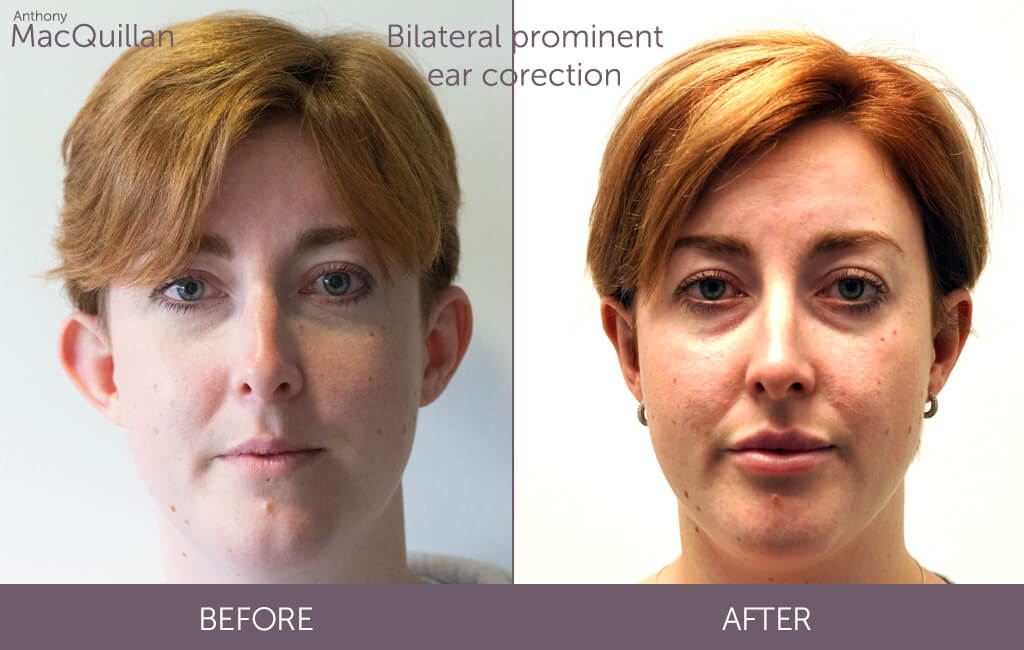Age Considerations for Otoplasty
When considering alterations to your physical appearance, Ear surgery, or Otoplasty, presents a compelling option. This procedure aims to adjust the shape, position, or size of the ears, offering a solution for you if you feel discomfort or dissatisfaction with your appearance. The decision to undergo Otoplasty involves various considerations, including the timing of the procedure.
The question of the optimal age for Ear surgery is influenced by factors ranging from physical development to emotional readiness.
Consultant Plastic Surgeon Anthony MacQuillan will walk you through everything you need to know about Otoplasty in this blog.
Ear Development
The development of the ears is a process that continues over several years, typically concluding around the age of six. This gradual progression plays a significant role in determining the appropriate timing for Ear surgery.
- Early Stages: In the initial years of life, the ears undergo significant changes in both size and shape. It is critical to monitor these transformations, as premature surgical interventions might necessitate revisions in the future.
- Final Stages: By the age of six, the ears have usually reached their full size, making this a potential time frame for assessing the suitability of Ear surgery. However, emotional and psychological readiness also becomes a factor in decision-making.
Otoplasty during Early Childhood
The topic of Ear surgery during early childhood is one that gains much attention. Advocates for early intervention suggest that addressing ear shape or size concerns at a young age can have positive effects, both in terms of physical outcome and social experiences.
- Physical Advantages: Performing Ear surgery at a young age can be beneficial due to the pliability of the cartilage, allowing for more straightforward adjustments and potentially smoother healing processes.
- Social Considerations: Children before school age may be less aware of the social implications of their appearance, possibly reducing the impact on their social interactions. But as children grow and become more immersed in social environments, they may become more conscious of their appearance, which can affect their interactions and experiences with peers.
- Emotional Readiness: While physical readiness is a factor, the emotional and psychological aspects of undergoing surgery at a young age must also be carefully considered. The involvement and support of parents or guardians are indispensable in making such a decision, ensuring that the child’s needs and best interests are at the forefront.
Ear Surgery in Adolescence
Adolescence marks a period of significant personal and physical development. For many, this is a time of increased self-awareness and a desire for independence, including decisions about personal appearance. When it comes to Ear surgery, the adolescent years present a unique set of considerations:
- Physical Maturity: By adolescence, the ears have typically reached their full adult size, providing a stable foundation for surgical adjustments. This stability is advantageous, reducing the likelihood of needing future revisions.
- Emotional and Psychological Maturity: Adolescents are at a stage where they can more fully understand the implications of surgery, including the recovery process and the potential for lasting change. This understanding allows them to actively participate in the decision-making process, ensuring their expectations and desires are clearly communicated.
- Social Dynamics: The social landscape for adolescents is complex, with peer opinions and social interactions playing a significant role in their daily lives. For some, the decision to undergo Ear surgery may be motivated by a desire to feel more at ease in social situations, potentially leading to improved interactions with peers.
Adult Otoplasty – Challenges and Benefits
Considering Ear surgery in adulthood brings its own set of challenges and advantages. Adults have the autonomy to make informed decisions about their health and appearance, but they also face different considerations compared to younger candidates:
- Informed Decision-Making: Adults have the capacity to thoroughly research and consider the implications of surgery, including the risks, benefits, and recovery expectations. This level of autonomy and responsibility is crucial in making an informed choice that aligns with their personal and aesthetic goals.
- Lifestyle Considerations: Adults need to consider the impact of surgery on their professional and personal responsibilities. Planning for recovery time, potential time off work, and other commitments is essential.
- Potential for Long-standing Desire: For many adults, the decision to pursue Ear surgery may follow years of consideration. This long-standing desire can result in a high level of satisfaction with the outcomes, as the change addresses concerns that have been present for a significant period.
Surgical Techniques for Ear Surgery
Advancements in medical technology have broadened the possibilities for Ear surgery, making it accessible and effective for individuals across all age groups. These innovations have not only improved surgical outcomes but have also enhanced safety and reduced recovery times:
- Minimally Invasive Options: New techniques and technologies have led to minimally invasive procedures that reduce scarring and speed up the recovery process. These options are particularly appealing for those concerned about the visibility of surgery.
- Customisation and Precision: Modern surgical approaches allow for a high degree of customisation, tailoring the procedure to the specific needs and anatomy of each patient. This precision contributes to more natural-looking results and higher satisfaction rates.
- Safety and Efficiency: Enhanced surgical techniques and better anaesthesia options have made Ear surgery safer and more efficient. These improvements help to mitigate concerns about risks and complications, making the decision to proceed with surgery a more comfortable one for patients and their families.
Family’s Role in the Decision-Making Process
The decision to undergo Ear surgery, especially for younger individuals, often involves the entire family. The support system and the collective approach to making this decision can significantly impact the individual’s experience and outcome:
- For Children: Parents or guardians play a pivotal role in deciding whether to proceed with Ear surgery for their children. It’s vital to consider the child’s feelings and preferences, balancing them with parental instincts for the child’s best interest.
- Adolescents and Family Dynamics: As teenagers assert their independence, the decision to undergo Ear surgery can become a point of negotiation within the family. Respectful dialogue and mutual understanding are crucial in reaching a decision that honours the adolescent’s autonomy while ensuring they are fully informed.
- Adult Decisions and Family Support: Even as adults make independent decisions about Ear surgery, the support and understanding of family or significant others can provide essential emotional backing. Discussions about expectations and practical support during recovery are beneficial.
Consultation with a Specialist for Otoplasty
Prior to making any decisions about Ear surgery, consulting with a specialist is an essential first step. This consultation provides a foundation for understanding the feasibility, risks, and expected outcomes of the procedure.
- Gathering Information: Anthony can offer detailed insights into the surgical process, answering any questions and addressing concerns. This information is vital for setting realistic expectations.
- Assessment and Recommendations: Every individual’s anatomy and expectations are unique. Anthony can assess suitability for surgery, recommend the best course of action, and tailor advice according to age and specific needs.
- Building Trust: Establishing a rapport with the surgeon is crucial. This trust ensures that patients feel comfortable and supported throughout their surgical journey.
The approach to Ear surgery must be customised to fit the individual’s unique needs, including their age, the specifics of their condition, and their personal goals.
- Tailoring Techniques: Advances in surgical techniques mean procedures can be precisely adapted to achieve the desired outcome while minimising recovery time and maximising safety.
- Considering Lifestyle and Goals: The surgical plan should consider the patient’s lifestyle, activities, and how the surgery fits into their broader life goals, ensuring the outcomes align with their expectations.
- Age as a Factor: Age-specific considerations, such as the maturity of ear cartilage in children or the impact on professional life for adults, are critical in customising the surgical approach.
FAQs about Ear Surgery
What is the recommended age for children to undergo Ear surgery (Otoplasty)?
- The recommended age for children to undergo Ear surgery is typically after the ears have reached their full size, which usually occurs around the age of 5 to 6 years. Surgery at this age allows for the correction of issues before they might cause social or psychological distress, and children at this age tend to recover quickly. However, the emotional readiness of the child and the family’s preferences are also important factors to consider.
Can teenagers have Ear surgery?
- Yes, teenagers can undergo Ear surgery, and it is a common time for this procedure. Teenagers are more capable of expressing their desires and feelings about the surgery, which can be beneficial for setting realistic expectations. Additionally, undergoing surgery before or during the teenage years can help alleviate any concerns related to the appearance of the ears before they become a significant source of self-consciousness.
Is there an age limit for adults considering Ear surgery?
- There is no strict age limit for adults considering Ear surgery. Adults can benefit from Otoplasty as long as they are in good general health and have realistic expectations about the outcomes. The decision to undergo Ear surgery can be influenced by a lifelong desire to adjust the appearance of the ears or resolve issues that have impacted one’s self-perception.
Does the best age for Ear surgery differ depending on the reason for the procedure?
- The optimal age for Ear surgery might vary depending on the specific concerns being addressed. For structural issues like protruding ears, early childhood is often ideal. For concerns that develop later in life or require the individual to make a personal decision about cosmetic changes, there is more flexibility in timing. The key is ensuring that the individual is at an appropriate age to understand the procedure and its outcomes.
What factors should be considered when deciding on the best age for Ear surgery?
Several factors should be considered when deciding on the best age for Ear surgery, including:
- Physical development: The ears should be fully developed, which typically occurs by age 5 to 6 in children.
- Emotional readiness: The individual, whether a child or adult, should be emotionally prepared for the surgery and its recovery.
- Social considerations: For children and teenagers, the potential impact of ear appearance on social interactions and confidence may influence the timing.
- Health and safety: Overall health and the ability to undergo surgery safely are paramount at any age.
What does the Ear surgery process involve?
- Consultation: Meeting with a surgeon to discuss goals, options, and potential outcomes.
- Preparation: Following pre-surgery instructions, which may include adjustments to medication, diet, and lifestyle.
- The Procedure: Depending on the complexity, otoplasty can take between one to three hours and is usually performed under general anaesthesia for children and local or general anaesthesia for adults.
- Recovery: Post-operative care includes wearing a bandage for a few days, followed by a headband, and avoiding activities that might impact healing.
How long does recovery from Ear surgery take?
- Recovery times can vary, but most individuals can return to work or school within a week, with some precautions. Full recovery and the final results might take up to six weeks, during which time strenuous activities should be avoided. Anthony will provide specific guidelines for a safe and efficient recovery process.
Are the results of Ear surgery permanent?
- Yes, the results of Ear surgery are generally considered permanent. The alterations made to the ear structure during the procedure are designed to last a lifetime. However, it’s important to have realistic expectations and understand that all surgical outcomes can vary slightly based on individual healing processes and other factors.
What are the risks associated with Ear surgery?
As with any surgical procedure, Ear surgery carries some risks, which may include:
- Infection: Although rare, infections can occur and are typically treatable with antibiotics.
- Scarring: Incisions are usually made in inconspicuous locations to minimise visible scarring, but some individuals may scar more prominently.
- Asymmetry: There might be minor differences in symmetry between the ears, which is normal to some extent in all individuals.
- Dissatisfaction with Results: While most people are pleased with their outcomes, it’s essential to have realistic expectations and discuss potential results thoroughly with Anthony.
Further Reading about Surgery with Consultant Plastic Surgeon Anthony MacQuillan
- Recovery after Facelift
- Procedures to Have with a Facelift
- Hooded Eyelids
- Recovery after Blepharoplasty
- EXTRA – Safety Concerns about Breast Implants
Medical References about Otoplasty
- Otoplasty – techniques, characteristics and risks – NCBI
- Otoplasty – Mayo Clinic
- Clinical article Otoplasty for correction of the prominent ear – Science Direct
- Quality of life after otoplasty for prominent ears in children – Science Direct
- Otoplasty: Definition, benefits, and what to expect – Medical News Today



